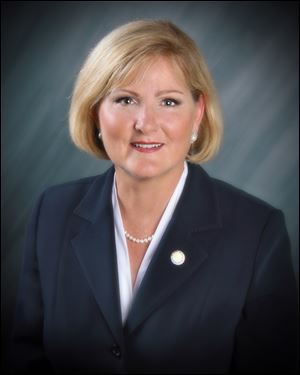
Trafficking panel urges more steps
6/27/2012
Rep. Teresa Fedor is the sponsor of the anti-trafficking law that is to be signed today.
COLUMBUS -- Businesses that participate in the human trafficking pipeline should be forced to surrender their licenses and shutter their doors, a state panel will recommend today.
The Ohio Human Trafficking Task Force, an interagency panel created by Gov. John Kasich, will call also for broad training for state employees, law enforcement, investigators, professional licensing boards, school nurses, foster parents, and others who would be in the best position to recognize modern-day slavery, whether in the sex trade, on farms, or in the corner nail salon.
Release of the report will coincide today with Mr. Kasich's signing in Toledo of House Bill 262, the so-called "Safe Harbor'' law sponsored by Rep. Teresa Fedor (D., Toledo). Both the Ohio House and Senate passed the bill unanimously. It will take effect immediately upon the governor's signature.
House Bill 262 seeks to prompt Ohio government and law enforcement to look at minors involved in the sex trade as victims rather than criminals. It will allow juvenile court judges to stave off criminal charges in favor of drug and alcohol treatment, counseling, and other programs for minors picked up for solicitation; increase criminal penalties for the pimps and traffickers who sell them and the "johns" who hire them, and step up efforts to get the word out to victims that help is available if they seek it out.
"Our first step was to work in collaboration with the recently passed bill," said Jai Chabria, the governor's senior adviser who headed the commission. "The bill dealt with penalties for traffickers and pimps. This deals a lot more with providing services to victims and raising awareness."
The task force recommends a statewide public awareness program on top of the hot-line poster that the law requires, and it seeks to increase victim access to prompt medical, addiction, psychological, housing, and other services.
But the panel also proposes going further by creating a position to oversee the state's implementation of anti-trafficking efforts and to work with local governments and law enforcement.
The report offers no new state money and would instead count on getting new federal grants and using existing ones to pay for some of its efforts, including the salary of that new employee.
The only recommendation that appears to require legislative approval is the revocation of individual professional licenses of those convicted of trafficking along with the licenses of those businesses that play a role.
The recommendations specifically call for the Ohio Department of Job and Family Services to adjust its policies regarding non-U.S. citizens who are legally residing in the state to ensure they could smoothly receive services under Medicaid and the Children's Health Insurance Program.
The recommendations, however, do not touch on how the state might provide services to illegal residents. Testimony before lawmakers has suggested that one method employed by traffickers to maintain control over their victims is the threat that they would be deported if they sought help.
"We are focusing on places where we can make the most impact right away," Mr. Chabria said. "Statistics show that most of the folks are Americans who are trafficked here. … We will continue to work at this problem."
He noted that the task force will continue to operate.
"As we learn more and dive more into this … " Mr. Chabria said, "we don't know a lot about human trafficking, certainly not in this state. The more we learn and work with our partners, we will find more solutions."
The report also calls for:
Adoption of a response protocol by the Ohio Department of Health to be followed in the treatment of victims.
Creation of a standardized screening process to be used by state service providers to help identify victims, including those in the state prison and youth detention systems.
Prevention efforts targeting at-risk youths, such as runaways and foster children.
Four hours of required in-service training for law enforcement, court, correctional, first-responder, and regulatory employees in trafficking, and provision of elective training to other public employees.
Contact Jim Provance at: jprovance @theblade.com or 614-221-0496.